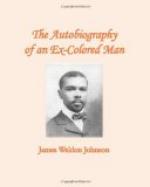But the real enthusiasm was aroused by “Shiny.” He was the principal speaker of the day, and well did he measure up to the honor. He made a striking picture, that thin little black boy standing on the platform, dressed in clothes that did not fit him any too well, his eyes burning with excitement, his shrill, musical voice vibrating in tones of appealing defiance, and his black face alight with such great intelligence and earnestness as to be positively handsome. What were his thoughts when he stepped forward and looked into that crowd of faces, all white with the exception of a score or so that were lost to view? I do not know, but I fancy he felt his loneliness. I think there must have rushed over him a feeling akin to that of a gladiator tossed into the arena and bade to fight for his life. I think that solitary little black figure standing there felt that for the particular time and place he bore the weight and responsibility of his race; that for him to fail meant general defeat; but he won, and nobly. His oration was Wendell Phillips’s “Toussaint L’Ouverture,” a speech which may now be classed as rhetorical—even, perhaps, bombastic; but as the words fell from “Shiny’s” lips their effect was magical. How so young an orator could stir so great enthusiasm was to be wondered at. When, in the famous peroration, his voice, trembling with suppressed emotion, rose higher and higher and then rested on the name “Toussaint L’Ouverture,” it was like touching an electric button which loosed the pent-up feelings of his listeners. They actually rose to him.
I have since known of colored men who have been chosen as class orators in our leading universities, of others who have played on the varsity football and baseball teams, of colored speakers who have addressed great white audiences. In each of these instances I believe the men were stirred by the same emotions which actuated “Shiny” on the day of his graduation; and, too, in each case where the efforts have reached any high standard of excellence they have been followed by the same phenomenon of enthusiasm. I think the explanation of the latter lies in what is a basic, though often dormant, principle of the Anglo-Saxon heart, love of fair play. “Shiny,” it is true, was what is so common in his race, a natural orator; but I doubt that any white boy of equal talent could have wrought the same effect. The sight of that boy gallantly waging with puny, black arms so unequal a battle touched the deep springs in the hearts of his audience, and they were swept by a wave of sympathy and admiration.
But the effect upon me of “Shiny’s” speech was double; I not only shared the enthusiasm of his audience, but he imparted to me some of his own enthusiasm. I felt leap within me pride that I was colored; and I began to form wild dreams of bringing glory and honor to the Negro race. For days I could talk of nothing else with my mother except my ambitions to be a great man, a great colored man, to reflect credit on the race and gain fame for myself. It was not until years after that I formulated a definite and feasible plan for realizing my dreams.




